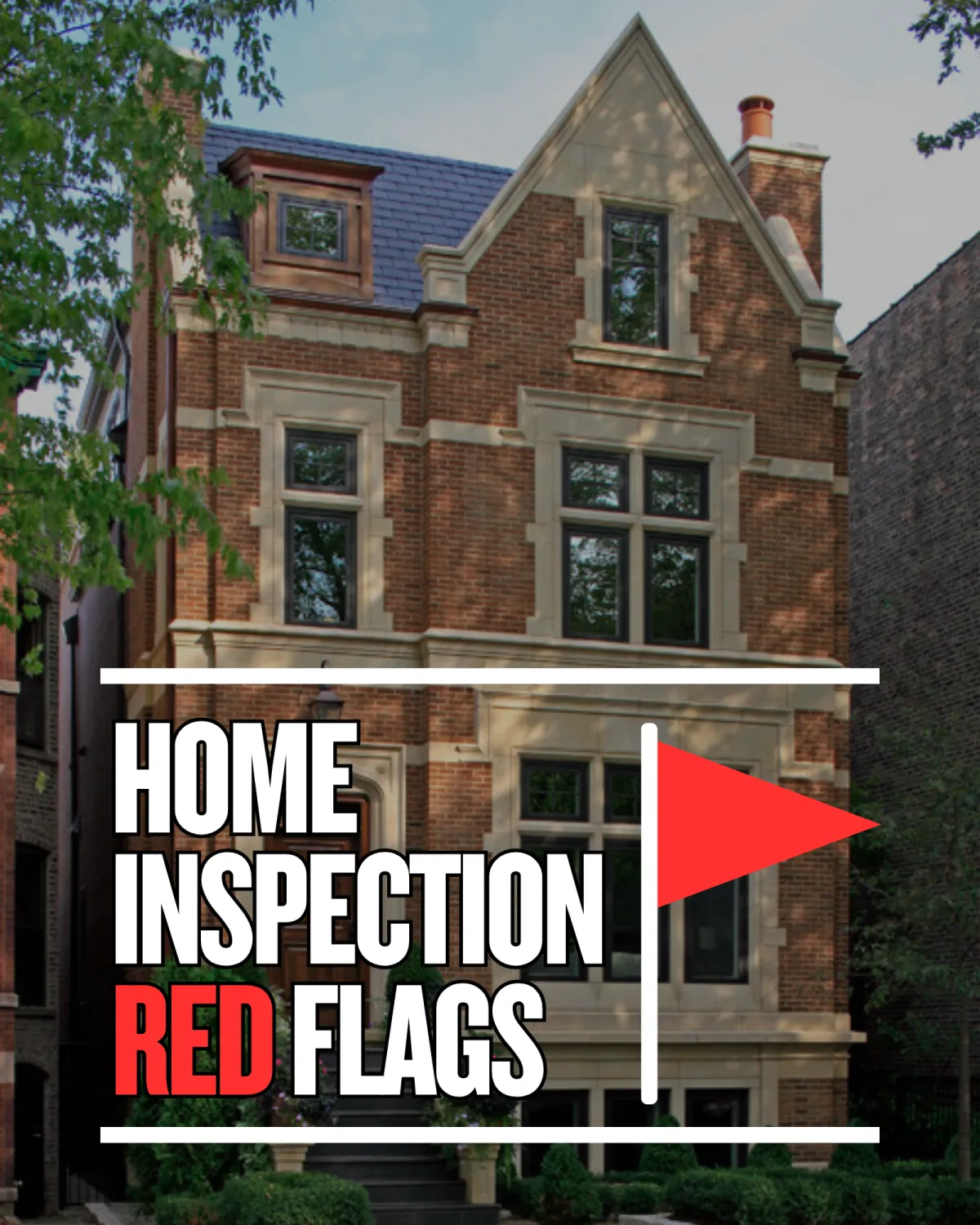
Chicago Home Inspection Red Flags: What Every Buyer Should Know
Thinking of buying a home in Chicago? One of the most critical steps in the process is the home inspection. It's not the flashiest part of your Chicago home buying journey, but it can be one of the most important. Why? Because a thorough inspection helps you avoid costly surprises, gives you a clearer picture of what you're walking into, and can even strengthen your position during negotiations in Chicago's competitive market.
Whether you're purchasing your first Lincoln Park condo, a vintage Wicker Park single-family home, or an investment property in Logan Square, here are some of the biggest red flags that Chicago buyers should be on the lookout for.
Major Chicago Home Inspection Red Flags
1. Roof Issues in Chicago Homes
Chicago's harsh winters and severe weather patterns can take a serious toll on roofing systems. Roofs don't last forever, and replacing one can be a significant expense, especially on multi-story Chicago properties. Missing shingles, sagging areas, or signs of significant wear and tear should make you pause. These aren't just cosmetic issues—they can lead to leaks, water damage, and expensive repairs that are particularly problematic during Chicago's heavy snow and rain seasons.
What to look for: Ice dam damage, missing or loose shingles, gutters pulling away from the house, and signs of previous leak repairs.
2. Plumbing Problems Common in Older Chicago Properties
Many Chicago homes were built decades ago, and aging plumbing systems are a common concern, especially in neighborhoods like Old Town, Gold Coast, and Lincoln Square. Pay close attention to what's happening under sinks, in basements, and around exposed pipes. Rust, damp spots, or leaks could mean ongoing water problems. Left unaddressed, plumbing issues can spiral into foundation damage, mold growth, or major renovation costs.
Chicago-specific concerns: Lead pipes in older homes, frozen pipe damage from harsh winters, and basement flooding issues common in certain Chicago neighborhoods.
3. Electrical Concerns in Vintage Chicago Homes
Chicago has many beautiful older homes and condos, and with that charm comes outdated wiring. Flickering lights, old breaker panels, knob-and-tube wiring, or amateur electrical work can all point to safety hazards. This is particularly important in Chicago's historic neighborhoods where homes may not have been updated to modern electrical standards.
Red flags include: Aluminum wiring, overloaded circuits, missing GFCI outlets in bathrooms and kitchens, and electrical panels that haven't been updated in decades.
4. Moisture & Mold Issues in Chicago's Climate
Chicago's humid summers and wet springs create perfect conditions for moisture problems. A musty odor in a basement or visible mildew on walls usually means there's more happening behind the scenes. Moisture problems can lead to mold growth, which impacts not just your home's value but your health as well. In Chicago, basement moisture is particularly common due to the area's clay soil and proximity to Lake Michigan.
Watch for: Basement seepage, condensation issues, poor ventilation, and signs of previous flooding—especially important given Chicago's history of severe storms.
5. Foundation Cracks and Structural Issues
Some small cracks are common in older Chicago homes due to the area's freeze-thaw cycles, but large or widening cracks in walls and floors can indicate serious structural concerns. Chicago's clay soil can shift significantly with weather changes, potentially affecting foundation stability. Repairs in this area aren't just expensive—they can affect the safety and stability of the entire home.
Chicago considerations: Settlement issues due to clay soil, foundation problems from harsh winter conditions, and structural concerns in older brick buildings common throughout the city.
Additional Chicago-Specific Inspection Concerns
HVAC Systems and Chicago Weather
Chicago's extreme temperature variations put significant stress on heating and cooling systems. During your inspection, pay special attention to:
Furnace age and condition (critical for Chicago winters)
Ductwork in older homes
Air conditioning capacity for humid summers
Proper insulation for energy efficiency
Windows and Insulation
Energy efficiency is crucial in Chicago's climate. Look for:
Single-pane windows that should be upgraded
Poor insulation leading to high energy bills
Drafty areas that will be problematic in winter
Storm windows and proper weatherproofing
Why Professional Home Inspections Matter in Chicago
It's easy to fall in love with a home's curb appeal, location, or layout—especially in Chicago's beautiful neighborhoods. But the inspection is what tells you whether that dream home is truly built to last through Chicago's challenging weather conditions. A professional inspector familiar with Chicago-area homes can uncover issues that aren't visible during a showing, giving you the information you need to decide whether to move forward, renegotiate, or walk away.
Working with Chicago Home Inspectors
When choosing a home inspector in Chicago, look for professionals who understand:
Local building codes and regulations
Common issues in Chicago-area homes
Weather-related concerns specific to the region
Neighborhood-specific problems (flooding zones, soil issues, etc.)
The Bottom Line for Chicago Homebuyers
Buying a home in Chicago is a major investment, and the city's unique climate and housing stock present specific challenges. Skipping the inspection—or ignoring red flags—can turn your purchase into a costly project. The smartest move you can make is to go in prepared, knowing what to look for and leaning on professionals who understand Chicago's real estate market.
A thorough inspection gives you negotiating power and peace of mind, ensuring your Chicago home purchase is a sound investment for years to come.
Let's Talk Strategy: Your Chicago Home Buying Journey Starts Here
Are you thinking about buying in Chicago this year? I've helped clients navigate inspections on everything from historic Lakeview graystones to modern River North condos. My experience with Chicago's diverse housing stock means I know what to look for and can connect you with the city's top home inspectors.
If you'd like to talk through what to expect during the inspection process—or want referrals to some of Chicago's most trusted home inspectors—let's connect.


